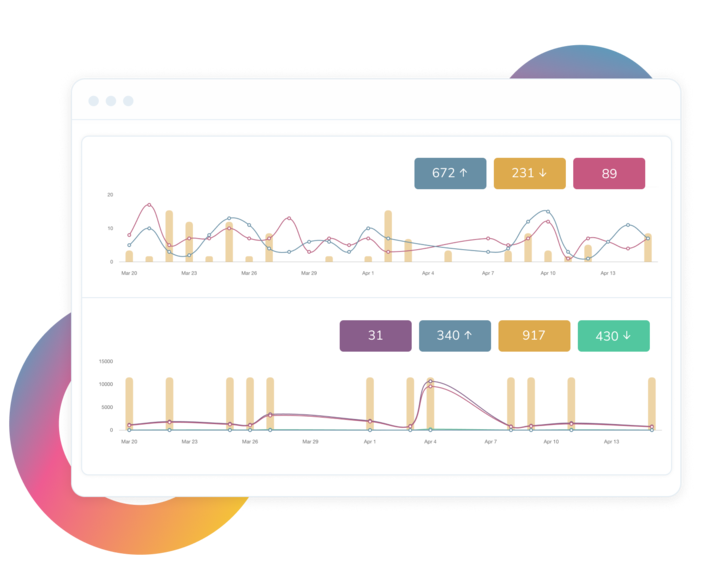The International Executive MBA is designed to solve the most critical challenges faced by leaders like you in a globalised and constantly changing business env
 Blog
BlogWhat is Marketing? The indispensable element for your company.
Marketing is a fundamental concept for any company seeking to connect with its target audience and achieve its business objectives. Throughout this article, we will explore its definition, its evolution until the advent of artificial intelligence and the essential tools that make it up. Read on to find out more about this fast-growing field!
What is marketing?
Marketing is the process by which a company identifies, anticipates and satisfies consumer needs through the creation, promotion and distribution of products and services. Philip Kotler, a key figure in modern marketing, defines it as a social and managerial process by which individuals and groups obtain what they need and want through the creation and exchange of value with others.
The evolution of marketing: from barter to digital marketing
Marketing has undergone a continuous and profound transformation, adapting to technological and social changes over time. This journey has not only redefined how companies engage with consumers, but also how consumers interact with brands. In this section of the article, we explore the evolution of marketing and its impact on today's world.

1. From early exchanges to modern marketing: origins and consolidation
The first traces of what we understand today as marketing date back to ancient civilisations, where trade was mainly conducted through barter. With the invention of currency and the emergence of local markets, rudimentary persuasion techniques began to be developed to improve product weaknesses and increase customers. During the Industrial Revolution, mass production and improved transportation systems allowed ‘brands’ to reach a wider audience, marking the beginning of modern marketing.
The creation of large-scale products demanded differentiation in a saturated market, leading to the development of promotional and advertising strategies. This was a turning point in the history of marketing, as competition for the attention of the end consumer intensified. Companies began to use strategies and actions through print media, newspaper advertisements and eventually radio to promote their products and services. These initial efforts laid the foundation for what would later become known as consumer-oriented marketing.
2. 20th century: the professionalisation of marketing and consumer orientation
During the 20th century, marketing established itself as an essential discipline for any company or brand. The explosion of media such as television and radio made it possible to create strategies and types of ads to capture the attention of the ideal customer. The American Marketing Association ‘s definition of marketing began to take shape, highlighting the importance of understanding and satisfying market needs and consumer desires.
At this time, the main focus of marketing was primarily on product orientation, but over time it evolved into customer satisfaction. The 4 P's of marketing (product, price, place (point of sale) and promotion) were developed and became the fundamental framework for designing effective strategies.
Advertising and promotion were no longer only aimed at attracting potential customers, but also at improving the image and strengthening consumer loyalty. Relationship marketing began to take hold, focusing on maintaining a lasting and positive relationship with existing customers.
3. The rise of digital marketing: from websites to content marketing
The advent of the Internet at the end of the 20th century completely revolutionised the field of marketing, ushering in the era of digital marketing. Websites and digital platforms enabled companies to gain valuable insights into consumer behaviour and personalise their offers in real time.
Digital marketing encompasses various tools and techniques such as SEO (Search Engine Optimisation), email marketing and social media advertising campaigns, which have become pillars of any digital strategy.
Google Ads has emerged as one of the most powerful online advertising platforms, allowing brands to capture the attention of their target audience efficiently and measure the results of their campaigns accurately.
Content marketing has established itself as a key strategy to improve the visibility and authority of a website, creating added value for the user and establishing the company as a benchmark in its industry.
Social media and mobile devices further revolutionised marketing, giving way to influencer marketing and viral marketing, which allow reaching millions of users quickly and effectively. Brands began to create relevant and authentic content that resonated with their audience, which helped to design personalised strategies that responded to the specific needs of the target market.
4. Artificial intelligence, Big Data and marketing automation: the future of marketing
In today's world, marketing has become a highly technological and data-driven discipline. Artificial intelligence (AI) and Big Data have enabled marketers to analyse large volumes of information to identify opportunities, design effective strategies and improve the customer experience. Marketing automation tools such as Chat-GPT and Midjourney allow marketers to create and manage campaigns more efficiently, optimising the buyer journey and ensuring that messages reach potential customers at the right time.
Thanks to the rise of social media in recent years, new types of marketing have emerged, such as performance marketing and growth marketing. These focus on maximising results through constant analysis of key metrics. This includes everything from lead acquisition to customer conversion and retention. Platforms such as Google Analytics allow you to analyse campaign results and adjust strategies to achieve a greater return on investment.
New technologies such as virtual reality and AI continue to transform the landscape, offering new ways to create a strategy to promote products and services. Today, it's not just about capturing attention, it's about strategic marketing that, thanks to new tools and techniques, can establish meaningful relationships that drive loyalty and meet audience needs.

The importance of marketing in everyday life
Marketing plays a crucial role not only in business, but also in our daily lives, influencing us constantly. From artificial intelligence and social media to traditional media advertising, marketing is everywhere. Its omnipresence has led to many of our daily decisions being shaped by these strategies. Marketing automation enables the creation of highly personalised experiences that accompany the customer at every stage of the buyer journey, from product discovery to purchase, directly influencing their daily lives.
Marketing, in its many forms, is present everywhere. It is not only about the actions companies take to promote their products or services, but also about how individuals and organisations communicate, influence and build relationships. Whether personal, business or social, marketing is a fundamental part of our behaviour.
Types of marketing
As we have discussed above, marketing over the years has emerged in a variety of strategies that span multiple disciplines, each with a specific objective. Some of the most prominent areas are the following:
- Digital marketing: Currently the most important, this type of marketing as we will see below, has as its main objective to use digital platforms to promote products and services. Tools such as Google Ads, SEO and social media play a key role in this area. This allows to increase the visibility of small businesses, increase their sales and speed up their digital transformation process, a particularly common problem for small businesses in the Region of Murcia.
- Direct marketing: Direct marketing is a communication and sales strategy that seeks to establish an immediate and personalised connection between a company or brand and its target audience, without intermediaries. Unlike other forms of marketing that use mass media such as television or radio, direct marketing focuses on interacting directly with the consumer, using specific channels that allow a measurable and rapid response.
- Relationship marketing: This is a strategy focused on creating and maintaining long-term relationships between a company and its customers.
- Content marketing: It consists of the creation of relevant and valuable content to attract and retain a defined audience, positioning the brand as a leader in its sector. SEO is one of the most useful tools to make the content generated on your website relevant to Google and other search engines.
- Neuromarketing: Combines marketing techniques with neuroscience to understand how consumers make decisions. It focuses on perception, attention and emotion to optimise campaigns and products.
- Sensory Marketing: Involves the five senses (sight, hearing, smell, taste and touch) to create experiences that strengthen the emotional connection with the brand, influencing the consumer's perception and purchase decision.

Essential tools for digital marketing
Online marketing has become the fundamental pillar for companies to generate interest and make themselves known on the Internet, achieving the ultimate goal of the company, to sell. To achieve this, there are digital tools that have revolutionised the sector, offering companies new ways of acting to impact their audience.
Digital marketing requires a variety of specialised tools to optimise each area and improve the effectiveness of strategies. Here are types and examples of tools to create content in the most optimised way for each area of digital marketing. These tools are some of the keys to create cross-channel strategies ( SMART objectives) with useful information, clear objectives and build customer trust.
1. SEO (Search Engine Optimisation)
SEO is fundamental to improve the visibility and organic traffic of websites in search engines. Here are some key tools:
- Sistrix: Ideal for analysing the visibility and SEO performance of your website and that of your competitors. Sistrix also offers a number of free tools that are very useful for optimising your company's website.
- Ahrefs: Used for keyword research, link analysis, and technical SEO audits.
- SEMrush: Offers a complete competitor analysis, SEO audit, and keyword research.
- Google Search Console: Allows you to monitor your site's performance on Google and detect errors that may affect indexing.
2. Email marketing
Email marketing continues to be one of the most effective strategies for building customer loyalty and increasing conversions. The following tools will allow you to automate emails and manage campaigns efficiently:
- Mailrelay: Offers advanced automation features, segmentation, and campaign analysis.
- Mailchimp: Popular for its ease of use and marketing automation options.
- Brevo: Powerful tool that combines CRM and email automation for complete management.
3. Social media management
Managing your company's social media is crucial for brand visibility and audience interaction. Useful tools include:
- Metricool: Analyses, manages, and schedules posts across multiple platforms from one place.
- Hootsuite: Allows you to schedule posts, monitor interactions and analyse social media metrics.
- Buffer: Manages social media posts and provides analytics to optimise strategy.
Sprout Social: Offers scheduling, monitoring and advanced analytics to improve social presence.

Metricool is one of the best tools for scheduling and analysing metrics of your social media posts.
4. Content marketing
Content is the foundation of any digital marketing strategy. Essential tools for management and optimisation include:
- BuzzSumo: Helps find popular content and analyse the performance of articles on social networks.
- WordPress: Content management platform widely used to create and manage blogs and websites.
- Canva: Easy-to-use graphic design tool for creating engaging visual content.
- Grammarly: Ideal for proofreading and correcting texts, improving the quality of the content.
5. PPC (Pay Per Click)
Pay per click campaigns are essential to generate fast and highly targeted traffic. Tools that facilitate the management of PPC are:
- Google Ads: Main platform for creating paid ads on Google and its network of partners.
- Microsoft Advertising: Allows access to the Bing search network and is ideal for targeting a different audience.
- SpyFu: Analyses competitor campaigns and discovers valuable keywords for paid ads.
6. Analytics and measurement
Measurement and analytics are essential to evaluate the effectiveness of your digital marketing strategies. The following tools are essential:
- Google Analytics: The most widely used web analytics tool, ideal for monitoring user behaviour on your site.
- Hotjar: Provides heat maps and user recordings to better understand how users interact with your website.
7. Automation tools
Automating repetitive marketing processes allows you to focus on more complex strategies. Some tools include:
- HubSpot: Combines CRM, marketing automation and sales tools in one platform.
- ActiveCampaign: Excellent for email marketing automation and customer relationship management.
- Marketo: Aimed at large enterprises, it offers advanced automation and lead nurturing solutions.
8. CRM (Customer Relationship Management)
CRM systems are key to managing customer interactions and optimising communication:
- Salesforce: Offers complete CRM solutions with sales, marketing and customer service integration.
- Dynamics 365: Flexibility and customisation for SMEs and large companies, facilitating lead management and automation.
- Pipedrive: Intuitive and focused on sales and customer relationship management, ideal for sales teams.
9. Advertising on social networks
With these tools you can create social media campaigns, currently one of the most popular actions to reach specific audiences with high precision:
- Meta Ads: Tool for creating and managing ads on Facebook, Instagram and other Meta platforms.
- LinkedIn Ads: Ideal for B2B campaigns, allowing targeting by job title, industry, and more.
- Twitter Ads: Allows for the creation of targeted Twitter audience campaigns with advanced targeting.
Each area of digital marketing has to use specialised tools that, when correctly implemented, can improve efficiency, measure results, and achieve the strategic objectives of any company. In the following section we explain the different jobs that exist within a marketing department.
Roles and functions in a marketing department
To create optimal marketing strategies, within a marketing team, there must be several positions, each with specific responsibilities, but all aligned with the overall objectives of each company's marketing campaign. Below, we present the main positions that can exist in a marketing department and the functions performed by each of them.
The various positions in a marketing department have to establish objectives that are aligned for each of them.
1. Chief Marketing Officer (CMO)
The CMO is the leader of the department and is responsible for developing the overall marketing strategy, aligned with the company's global objectives. His or her main role is to oversee all the team's activities, ensuring that they stay within the established strategy and meet the KPIs (key performance indicators). He or she is also responsible for managing the marketing budget and reporting to senior management on campaign performance and the impact of marketing on business growth.
2. Marketing Manager
The marketing manager is responsible for executing the strategies set by the marketing director. Their role is to coordinate the team, oversee campaigns and ensure that all projects are completed on time and within budget. This role requires project management skills and a comprehensive understanding of all areas of marketing, from digital marketing to public relations.
In addition to day-to-day supervision, the marketing manager also performs market analysis to understand trends, identify customer needs and adjust marketing strategies where necessary. He or she maintains a hands-on approach to all activities, from planning to implementation.
3. Digital marketing specialist
The digital marketing specialist is responsible for all actions that take place in the online environment. This includes website management, SEO (search engine optimisation) strategies, Google Ads campaigns, social media and online advertising. Its main function is to increase the visibility of the company on the internet, generate web traffic and capture potential customers through digital channels. This professional also monitors the performance of digital campaigns through analytical and performance marketing tools.
4. Community manager
The community manager is in charge of managing and moderating the brand's presence on social networks. Their functions include creating content, interacting directly with followers and monitoring the conversations generated around the brand. This position is vital for maintaining a good public image and ensuring that the company's public relations are handled correctly in the digital environment.
5. SEO (Search Engine Optimisation) Specialist
The SEO specialist focuses on improving the visibility of the company's website on search engines, mainly Google. By using keywords, optimising content and improving technical aspects of the site, their role is to make the site appear among the top organic search results.
This position is crucial for driving relevant traffic to the company's website, which in turn contributes to lead generation and building the brand's digital authority. It also collaborates with the content team to ensure that content marketing strategies are aligned with SEO best practices.
6. Content manager
The Content Manager is responsible for planning, creating and managing all the content that the company distributes across its various channels. Their role is to develop relevant content, whether through blog articles, ebooks, infographics, videos or other formats, that engages and educates the audience.
The Content Manager works closely with the SEO team to optimise content for search engines, with the aim of attracting organic traffic. In addition, their responsibility includes designing content strategies that guide potential customers through the buyer journey, from the discovery stage to the final conversion.
7. Online advertising specialist (SEM/PPC Specialist)
This professional is in charge of managing all paid campaigns on platforms such as Google Ads, Meta Ads and other forms of online advertising. Their role is to drive highly targeted paid traffic to the company's websites or landing pages, with the objective of generating conversions.
The SEM/PPC Specialist must have a deep understanding of digital analytics to optimise campaign performance, reduce cost per click (CPC) and maximise return on investment (ROI).
8. Marketing analyst
The marketing analyst is responsible for collecting, analysing and interpreting data related to the performance of marketing campaigns. They use analytics tools, such as Google Analytics, to evaluate web traffic, customer behaviour and the overall performance of marketing strategies.
Through his or her analysis, the Marketing Analyst identifies weaknesses in campaigns and provides valuable information to help adjust strategies and improve results.
9. Graphic designer or creative director
The Graphic Designer or Creative Director is responsible for creating and overseeing the visual aspects of all marketing campaigns . From the creation of advertisements to website aesthetics and social media visuals, their job is to ensure that the brand identity remains consistent and engaging.
He or she works closely with the content and advertising team to ensure that the visuals support the key messages of the campaign and capture the attention of the audience.
10. CRM manager (Customer Relationship Manager)
The CRM Manager manages customer relationship management platforms, ensuring that the company maintains constant and personalised communication with potential and existing customers. This position is key to relationship marketing, maintaining customer loyalty and increasing value over time through email marketing and automation strategies.
The CRM Manager also works on customer segmentation and the design of specific campaigns that respond to the needs of different market segments, allowing the creation of closer relationships with customers and obtaining valuable information about their preferences.


Agri-food is a strategic sector for both the national and international economies.



A company or organization that anticipates, identifies needs and threats, foresees, and makes strategic and operational decisions based on Comprehensive Risk Management



In ENAE Business School's Official Master in Logistics and Operations Management program, you will learn how to analyse the performance of a company's operation

Business decision-making can no longer be based on intuition.


Master's Degree in Logistics in Spain: Key Factors for Choosing a Leading Program
Daniel Román Barker
Marketing Specialist at ENAE Business School, where he is part of the team responsible for planning, producing and optimising digital content for the enae.es and enae.com websites, as well as for the school's various social media channels. Using the Drupal CMS, he manages the publication and updating of pages and articles, ensuring brand consistency, content quality and user experience.
He specialises in SEO and performance marketing, defining and implementing the organic content strategy with the support of tools such as Sistrix and Google Search Console to improve positioning and qualified traffic to master's programmes and executive courses. In addition, he designs, configures, and optimises online advertising campaigns on Meta, LinkedIn, TikTok, and Google Ads, aligning segmentation, messaging, and objectives with student recruitment. His work contributes to ENAE's organic and paid growth and strengthens its position as a leading business school nationally and internationally.

Spanish companies hiring international talent: Your gateway is ENAE
Daniel Román Barker
Marketing Specialist at ENAE Business School, where he is part of the team responsible for planning, producing and optimising digital content for the enae.es and enae.com websites, as well as for the school's various social media channels. Using the Drupal CMS, he manages the publication and updating of pages and articles, ensuring brand consistency, content quality and user experience.
He specialises in SEO and performance marketing, defining and implementing the organic content strategy with the support of tools such as Sistrix and Google Search Console to improve positioning and qualified traffic to master's programmes and executive courses. In addition, he designs, configures, and optimises online advertising campaigns on Meta, LinkedIn, TikTok, and Google Ads, aligning segmentation, messaging, and objectives with student recruitment. His work contributes to ENAE's organic and paid growth and strengthens its position as a leading business school nationally and internationally.












